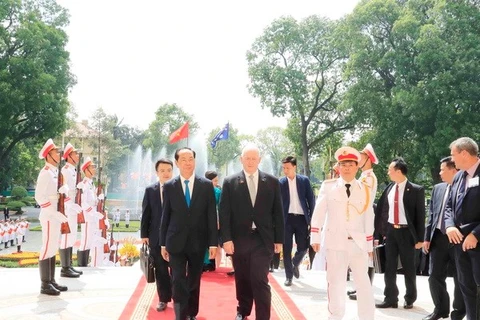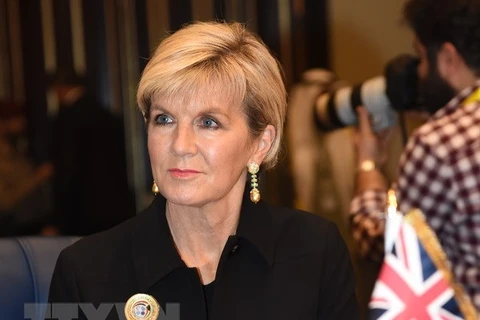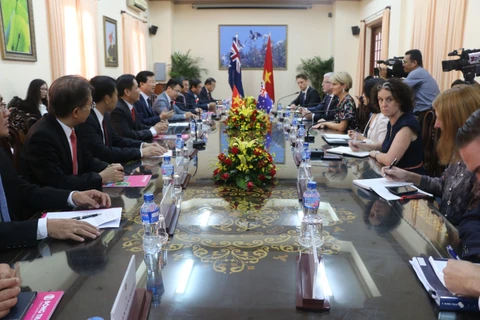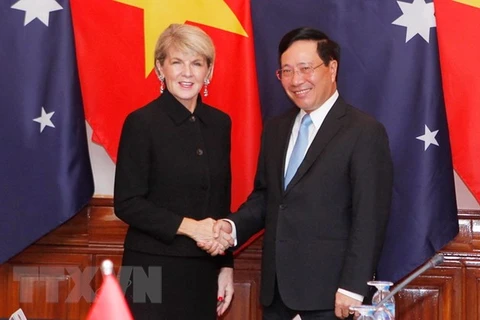Hanoi (VNA) – Vietnamese garment firms expect to navigate and increase garment exports to Australia once the Comprehensive and Progressive Agreement for Trans-Pacific Partnership (CPTPP) takes effect, said director of the Yen Duong Ltd, Co. Thai Binh Duong.
Under the CPTPP, Australia will reduce import tax to 5 percent in the first three years after the CPTPP enters into force, and waive itfrom the fourth year.
Truong Van Cam, Vice President and General Secretary of the Vietnam Textile and Apparel Association, said Australia’s apparel imports have grown stably over the past five years, 3-4 percent annually on average. Moreover, apparel retail prices in Australia aremuch higher the import ones, giving Vietnamese products an advantage.
However, Australia’s garment imports from China have accounted for more than 60 percent in recent years. Apart from China, India is also working to enter the market.
More than half of participating exhibitors in an international exhibition of garment materials held in mid-November in Melbourne were from China and one fourth were from India. In recent years, several Vietnamese enterprises have just joined the event.
According to Cam, Australian businesses often place small orders at first to explore supply capacity and market popularity. If successful, contracts of higher value could be signed at better prices.
Deputy head of the Ministry of Industry and Trade’s Department of Asia-Africa Markets Nguyen Phuc Nam said Australia is an important partner of Vietnam in Asia-Pacific. In 2017, Australia imported apparel worth nearly 9.32 billion USD, nearly 173 million USD of which was from Vietnam, roughly 1.9 percent of the total.
Australian companies are focusing more on Vietnam due to more competitive workforce costs than China’s.
To access the demanding market, Cam stressed the need to study demand, improve product design and workers’ skills, and invest in modern machinery.
Australia has a population of nearly 24 million people with a gross domestic product of nearly 1.39 trillion USD and average income per capita of about 50,000 USD each year, said the ministry.-VNA
Under the CPTPP, Australia will reduce import tax to 5 percent in the first three years after the CPTPP enters into force, and waive itfrom the fourth year.
Truong Van Cam, Vice President and General Secretary of the Vietnam Textile and Apparel Association, said Australia’s apparel imports have grown stably over the past five years, 3-4 percent annually on average. Moreover, apparel retail prices in Australia aremuch higher the import ones, giving Vietnamese products an advantage.
However, Australia’s garment imports from China have accounted for more than 60 percent in recent years. Apart from China, India is also working to enter the market.
More than half of participating exhibitors in an international exhibition of garment materials held in mid-November in Melbourne were from China and one fourth were from India. In recent years, several Vietnamese enterprises have just joined the event.
According to Cam, Australian businesses often place small orders at first to explore supply capacity and market popularity. If successful, contracts of higher value could be signed at better prices.
Deputy head of the Ministry of Industry and Trade’s Department of Asia-Africa Markets Nguyen Phuc Nam said Australia is an important partner of Vietnam in Asia-Pacific. In 2017, Australia imported apparel worth nearly 9.32 billion USD, nearly 173 million USD of which was from Vietnam, roughly 1.9 percent of the total.
Australian companies are focusing more on Vietnam due to more competitive workforce costs than China’s.
To access the demanding market, Cam stressed the need to study demand, improve product design and workers’ skills, and invest in modern machinery.
Australia has a population of nearly 24 million people with a gross domestic product of nearly 1.39 trillion USD and average income per capita of about 50,000 USD each year, said the ministry.-VNA
VNA
























